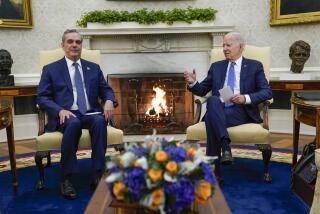Latin Summit Addresses Poverty Issues
- Share via
CARACAS, Venezuela — At birth, each child born in Latin America owes a symbolic $1,550 in foreign debt.
Nearly 50 out of every 1,000 Latin American children will die before their 6th birthday. Children who manage to survive their first five years probably won’t complete elementary school.
They likely be forced to work on the streets--or beg--before becoming a teenager. They’ll live in a slum without clean water and be malnourished. Their mothers, meanwhile, are likely to be unmarried--and are five times more likely to die while giving birth than women in a developed country.
Years into an era of freer trade known as globalization, these are the statistics that hundreds of Latin politicians, economists and activists grappled with this week at a poverty summit in Caracas, the Venezuelan capital.
While most Latin American countries embraced democracy and free markets over the last two decades, there are more have-nots today than there were in 1980.
“We should be ashamed,” Francisco Lopez Segrera, director of the Cuban office of the United Nations Educational, Scientific and Cultural Organization, told hundreds of delegates.
Segrera was one of dozens of speakers who blamed declining social conditions in Latin America on a lack of state investment in health care and education. Only two countries--Venezuela and Costa Rica--invest at least 6% of their gross domestic product on education, a standard set by UNESCO.
Delegate after delegate accused Latin governments of condemning their people to poverty by amassing a combined $750 million in foreign debt, a figure equal to 36% of the region’s GDP.
Most agreed that foreign debt has consolidated U.S. economic dominance over the region.
“Foreign debt has increased and, with it, poverty,” said Latin American Parliament delegate Otto Boye. “The only path . . . is to unite the power of those in debt. . . . If we negotiate this way, we can probably create a global payment plan that can liberate us from this vicious circle.”
The Latin American Parliament, representing 22 countries, organized the summit amid concern that plans to create a hemispheric Free Trade Area of the Americas by 2005 will widen the region’s gap between rich and poor.
More to Read
Sign up for Essential California
The most important California stories and recommendations in your inbox every morning.
You may occasionally receive promotional content from the Los Angeles Times.













